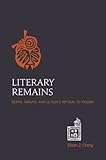Literary Remains : Death, Trauma, and Lu Xun's Refusal to Mourn / Eileen J. Cheng.
Material type: TextPublisher: Honolulu : University of Hawaii Press, [2013]Copyright date: ©2013Description: 1 online resource (320 p.) : 12 illusContent type:
TextPublisher: Honolulu : University of Hawaii Press, [2013]Copyright date: ©2013Description: 1 online resource (320 p.) : 12 illusContent type: - 9780824835958
- 9780824837808
- 895.1 8509 23
- online - DeGruyter
- Issued also in print.
| Item type | Current library | Call number | URL | Status | Notes | Barcode | |
|---|---|---|---|---|---|---|---|
 eBook
eBook
|
Biblioteca "Angelicum" Pont. Univ. S.Tommaso d'Aquino Nuvola online | online - DeGruyter (Browse shelf(Opens below)) | Online access | Not for loan (Accesso limitato) | Accesso per gli utenti autorizzati / Access for authorized users | (dgr)9780824837808 |
Browsing Biblioteca "Angelicum" Pont. Univ. S.Tommaso d'Aquino shelves, Shelving location: Nuvola online Close shelf browser (Hides shelf browser)

|

|

|

|

|

|

|
||
| online - DeGruyter Diversity in Diaspora : Hmong Americans in the Twenty-First Century / | online - DeGruyter Fertile Disorder : Spirit Possession and Its Provocation of the Modern / | online - DeGruyter Figures of Southeast Asian Modernity / | online - DeGruyter Literary Remains : Death, Trauma, and Lu Xun's Refusal to Mourn / | online - DeGruyter Making Sense of Micronesia : The Logic of Pacific Island Culture / | online - DeGruyter Non-Traditional Security Issues in North Korea / | online - DeGruyter Original Copies : Architectural Mimicry in Contemporary China / |
Frontmatter -- Contents -- Abbreviations -- Prologue -- Introduction -- Part One. Re-membering the Past -- 1. The Limits of Subjectivity -- 2. The Illegitimate Preface -- 3. (Un)Faithful Biographers -- Part Two. New Culture through the Prism of Tradition -- 4. Death by Applause -- 5. The Abandoned Lover -- 6. The Journey Home -- Part Three. Dialogic Encounters -- 7. Mocking the Sages -- 8. Disenchanted Fables -- Epilogue: Remembrance, Forgetting, and Radical Hope -- Acknowledgments -- Notes -- Glossary -- Works Cited -- Index -- About the Author
restricted access online access with authorization star
http://purl.org/coar/access_right/c_16ec
Lu Xun (1881-1936), arguably twentieth-century China's greatest writer, is commonly cast in the mold of a radical iconoclast who vehemently rejected traditional culture. The contradictions and ambivalence so central to his writings, however, are often overlooked. Challenging conventional depictions, Eileen J. Cheng's innovative readings capture Lu Xun's disenchantment with modernity and his transformative engagements with traditional literary conventions in his "modern" experimental works. Lurking behind the ambiguity at the heart of his writings are larger questions on the effects of cultural exchange, accommodation, and transformation that Lu Xun grappled with as a writer: How can a culture estranged from its vanishing traditions come to terms with its past? How can a culture, severed from its roots and alienated from the foreign conventions it appropriates, conceptualize its own present and future?Literary Remains shows how Lu Xun's own literary encounter with the modern involved a sustained engagement with the past. His creative writings-which imitate, adapt, and parody traditional literary conventions-represent and mirror the trauma of cultural disintegration, in content and in form. His contradictory, uncertain, and at times bizarrely incoherent narratives refuse to conform to conventional modes of meaning making or teleological notions of history, opening up imaginative possibilities for comprehending the past and present without necessarily reifying them. Behind Lu Xun's "refusal to mourn," that is, his insistence on keeping the past and the dead alive in writing, lies an ethical claim: to recover the redemptive meaning of loss. Like a solitary wanderer keeping vigil at the site of destruction, he sifts through the debris, composing epitaphs to mark both the presence and absence of that which has gone before and will soon come to pass. For in the rubble of what remains, he recovered precious gems of illumination through which to assess, critique, and transform the moment of the present. Literary Remains shows how Lu Xun's literary enterprise is driven by a "radical hope"-that, in spite of the destruction he witnessed and the limits of representation, his writings, like the texts that inspired his own, might somehow capture glimmers of the past and the present, and illuminate a future yet to unfold.Literary Remains will appeal to a wide audience of students and scholars interested in Lu Xun, modern China, cultural studies, and world literature.
Issued also in print.
Mode of access: Internet via World Wide Web.
In English.
Description based on online resource; title from PDF title page (publisher's Web site, viewed 02. Mrz 2022)


